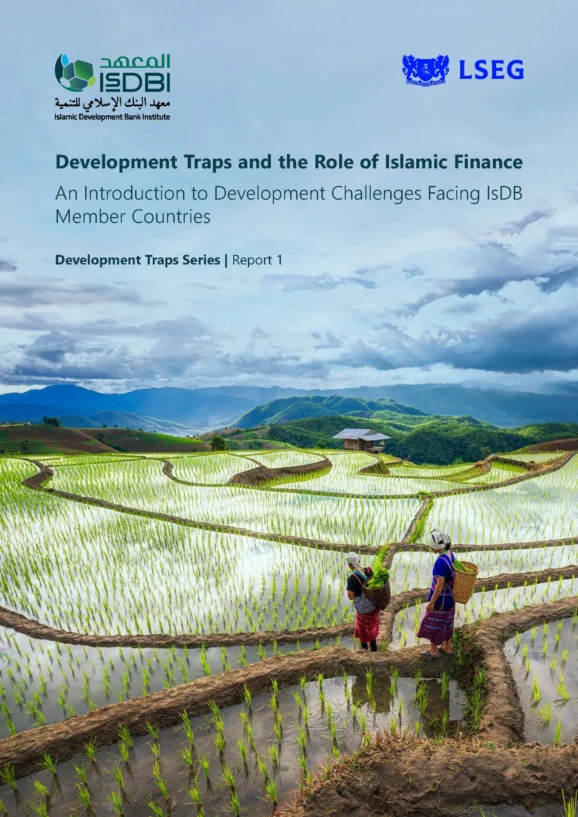Islamic Development Bank and London Stock Exchange Group launch study on ‘development traps’ facing emerging economies

John E. Kaye
- Published
- News

A joint study by the Islamic Development Bank Institute and the London Stock Exchange Group identifies five “development traps” holding back emerging economies, and argues that Islamic finance could provide the ethical, risk-sharing tools to help them escape
The Islamic Development Bank Institute and the London Stock Exchange Group have published a new report arguing that Islamic finance could help developing nations escape structural barriers to growth, in a collaboration linking one of the world’s major multilateral lenders with a cornerstone of global capital markets.
Launched in Manama, Bahrain, on Sunday at the 20th AAOIFI–IsDB Annual Islamic Banking and Finance Conference, the study — Development Traps and the Role of Islamic Finance — is the first volume in a joint research series examining the persistent economic obstacles faced by the 57 member countries of the Islamic Development Bank (IsDB).
Drawing on data from more than 20 international institutions including the World Bank, IMF, UNDP, WIPO, OPEC and ILO, the report sets out a framework for identifying five recurring “development traps”: the middle-income trap, the natural-resources trap, the SMEs and MSMEs trap, the debt trap and the technology trap.
It argues that these interlinked barriers have left many emerging economies caught between rapid population growth and insufficient diversification — and that Islamic finance tools such as sukūk (Islamic bonds), waqf (endowments), muḍārabah (profit-sharing) and zakāt (almsgiving) could provide stabilising alternatives to conventional debt-based finance.
Dr Sami Al-Suwailem, Acting Director-General of the IsDB Institute, said the project was designed to give policymakers early warning of risks and to integrate Islamic financial mechanisms into long-term planning.
“This report series represents an important milestone in our efforts to provide actionable intelligence for policymakers,” he said at the launch. “It offers early warning signals to help our member countries avoid structural traps and leverage the full potential of Islamic finance for sustainable, inclusive growth.”
He added that the collaboration with the London Stock Exchange Group “bridges the analytical rigour of global capital markets with the ethical and risk-sharing foundations of Islamic finance.”

The publication, above, also includes contributions from senior economists including Dr Bambang Brodjonegoro, Dean of the Asian Development Bank Institute, and Dr Mahmoud Mohieldin, the UN Special Envoy on Financing the 2030 Agenda for Sustainable Development.
Mustafa Adil, Head of Islamic Finance at LSEG, said the partnership showed how mainstream financial infrastructure could help scale up development finance in line with Islamic principles.
“Our partnership with IsDBI demonstrates how financial innovation and reliable data can be mobilised to address the most pressing development challenges,” he said. “Islamic finance is not only ethical, it is strategically positioned to deliver impact in emerging economies.”
The series will form the analytical basis for five follow-on reports, each examining one of the identified traps in greater depth. The next volume will address the middle-income trap, focusing on economic diversification, productivity and human-capital growth through Shariah-compliant mechanisms.
The IsDB Institute, the research arm of the Islamic Development Bank Group, leads policy and knowledge initiatives for the organisation’s member states, while LSEG — one of the world’s largest market-infrastructure providers — operates a specialist Islamic Finance division producing Shariah-compliant indices and sustainability analytics.
READ MORE: ‘ITFC extends $30m financing to Uzbekistan’s Hamkorbank’. A fresh US$30 million injection from the International Islamic Trade Finance Corporation is set to accelerate Uzbekistan’s shift towards ethical, sustainable finance — strengthening Hamkorbank’s role at the forefront of the country’s growing Islamic finance sector.
Do you have news to share or expertise to contribute? The European welcomes insights from business leaders and sector specialists. Get in touch with our editorial team to find out more.
Main image: Credit Abdulla Alkettab/Pexels
RECENT ARTICLES
-
 WATCH: Red Bull pilot lands plane on moving freight train in aviation first
WATCH: Red Bull pilot lands plane on moving freight train in aviation first -
 Europe eyes Australia-style social media crackdown for children
Europe eyes Australia-style social media crackdown for children -
 These European hotels have just been named Five-Star in Forbes Travel Guide’s 2026 awards
These European hotels have just been named Five-Star in Forbes Travel Guide’s 2026 awards -
 McDonald’s Valentine’s ‘McNugget Caviar’ giveaway sells out within minutes
McDonald’s Valentine’s ‘McNugget Caviar’ giveaway sells out within minutes -
 Europe opens NanoIC pilot line to design the computer chips of the 2030s
Europe opens NanoIC pilot line to design the computer chips of the 2030s -
 Zanzibar’s tourism boom ‘exposes new investment opportunities beyond hotels’
Zanzibar’s tourism boom ‘exposes new investment opportunities beyond hotels’ -
 Gen Z set to make up 34% of global workforce by 2034, new report says
Gen Z set to make up 34% of global workforce by 2034, new report says -
 The ideas and discoveries reshaping our future: Science Matters Volume 3, out now
The ideas and discoveries reshaping our future: Science Matters Volume 3, out now -
 Lasers finally unlock mystery of Charles Darwin’s specimen jars
Lasers finally unlock mystery of Charles Darwin’s specimen jars -
 Strong ESG records help firms take R&D global, study finds
Strong ESG records help firms take R&D global, study finds -
 European Commission issues new cancer prevention guidance as EU records 2.7m cases in a year
European Commission issues new cancer prevention guidance as EU records 2.7m cases in a year -
 Artemis II set to carry astronauts around the Moon for first time in 50 years
Artemis II set to carry astronauts around the Moon for first time in 50 years -
 Meet the AI-powered robot that can sort, load and run your laundry on its own
Meet the AI-powered robot that can sort, load and run your laundry on its own -
 Wingsuit skydivers blast through world’s tallest hotel at 124mph in Dubai stunt
Wingsuit skydivers blast through world’s tallest hotel at 124mph in Dubai stunt -
 Centrum Air to launch first European route with Tashkent–Frankfurt flights
Centrum Air to launch first European route with Tashkent–Frankfurt flights -
 UK organisations still falling short on GDPR compliance, benchmark report finds
UK organisations still falling short on GDPR compliance, benchmark report finds -
 Stanley Johnson appears on Ugandan national television during visit highlighting wildlife and conservation ties
Stanley Johnson appears on Ugandan national television during visit highlighting wildlife and conservation ties -
 Anniversary marks first civilian voyage to Antarctica 60 years ago
Anniversary marks first civilian voyage to Antarctica 60 years ago -
 Etihad ranked world’s safest airline for 2026
Etihad ranked world’s safest airline for 2026 -
 Read it here: Asset Management Matters — new supplement out now
Read it here: Asset Management Matters — new supplement out now -
 Breakthroughs that change how we understand health, biology and risk: the new Science Matters supplement is out now
Breakthroughs that change how we understand health, biology and risk: the new Science Matters supplement is out now -
 The new Residence & Citizenship Planning supplement: out now
The new Residence & Citizenship Planning supplement: out now -
 Prague named Europe’s top student city in new comparative study
Prague named Europe’s top student city in new comparative study -
 BGG expands production footprint and backs microalgae as social media drives unprecedented boom in natural wellness
BGG expands production footprint and backs microalgae as social media drives unprecedented boom in natural wellness -
 The European Winter 2026 edition - out now
The European Winter 2026 edition - out now



























